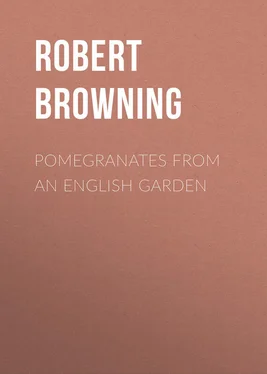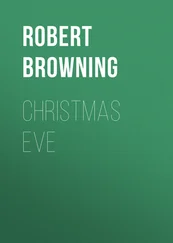Robert Browning - Pomegranates from an English Garden
Здесь есть возможность читать онлайн «Robert Browning - Pomegranates from an English Garden» — ознакомительный отрывок электронной книги совершенно бесплатно, а после прочтения отрывка купить полную версию. В некоторых случаях можно слушать аудио, скачать через торрент в формате fb2 и присутствует краткое содержание. Жанр: foreign_antique, foreign_prose, на английском языке. Описание произведения, (предисловие) а так же отзывы посетителей доступны на портале библиотеки ЛибКат.
- Название:Pomegranates from an English Garden
- Автор:
- Жанр:
- Год:неизвестен
- ISBN:нет данных
- Рейтинг книги:5 / 5. Голосов: 1
-
Избранное:Добавить в избранное
- Отзывы:
-
Ваша оценка:
- 100
- 1
- 2
- 3
- 4
- 5
Pomegranates from an English Garden: краткое содержание, описание и аннотация
Предлагаем к чтению аннотацию, описание, краткое содержание или предисловие (зависит от того, что написал сам автор книги «Pomegranates from an English Garden»). Если вы не нашли необходимую информацию о книге — напишите в комментариях, мы постараемся отыскать её.
Pomegranates from an English Garden — читать онлайн ознакомительный отрывок
Ниже представлен текст книги, разбитый по страницам. Система сохранения места последней прочитанной страницы, позволяет с удобством читать онлайн бесплатно книгу «Pomegranates from an English Garden», без необходимости каждый раз заново искать на чём Вы остановились. Поставьте закладку, и сможете в любой момент перейти на страницу, на которой закончили чтение.
Интервал:
Закладка:
Then off made buyer with a prize,
Then seller to his “Times” returned,
And so did day wear, wear, till eyes
Brightened apace, for rest was earned:
He locked door long ere candle burned.
And whither went he? Ask himself,
Not me! To change of scene, I think.
Once sold the ware and pursed the pelf,
Chaffer was scarce his meat and drink,
Nor all his music – money-chink.
Because a man has shop to mind
In time and place, since flesh must live,
Needs spirit lack all life behind,
All stray thoughts, fancies fugitive,
All loves except what trade can give?
I want to know a butcher paints,
A baker rhymes for his pursuit,
Candlestick-maker much acquaints
His soul with song, or, haply mute,
Blows out his brains upon the flute!
But – shop each day and all day long!
Friend, your good angel slept, your star
Suffered eclipse, fate did you wrong!
From where these sorts of treasures are,
There should our hearts be – Christ, how far!
There ought to be far more in a man than can be put into a front window. This man had all sorts of “curios” in his shop window, but there was nothing rich or rare in his soul; and so there was room for all of him in a den which would not have held the hundredth part of his wares. The contemptible manner of the man’s life is strikingly brought out by the various suppositions (stanzas 5, 6, 7) so different from the poor reality (8-9). All he cared for was business, which made him “chuckle” on the one hand or “chafe” on the other, according as times were good or bad (10). Even in his business it was not the real excellence of his wares he cared for, only their saleability (11). A merchant prince is a very different person (13-19). The last three stanzas give the lesson in a style partly humorous, but passing in the end to an impressive solemnity.
In connection with this should be read the companion piece, “House,” to which reference is made in the Introduction.
THE BOY AND THE ANGEL
Morning, evening, noon and night,
“Praise God!” sang Theocrite.
Then to his poor trade he turned,
Whereby the daily meal was earned.
Hard he laboured, long and well;
O’er his work the boy’s curls fell.
But ever, at each period,
He stopped and sang, “Praise God!”
Then back again his curls he threw,
And cheerful turned to work anew.
Said Blaise, the listening monk, “Well done;
“I doubt not thou art heard, my son:
“As well as if thy voice to-day
“Were praising God, the Pope’s great way.
“This Easter Day, the Pope at Rome
“Praises God from Peter’s dome.”
Said Theocrite, “Would God that I
“Might praise Him, that great way, and die!”
Night passed, day shone,
And Theocrite was gone.
With God a day endures alway,
A thousand years are but a day.
God said in heaven, “Nor day nor night
“Now brings the voice of my delight.”
Then Gabriel, like a rainbow’s birth,
Spread his wings and sank to earth;
Entered, in flesh, the empty cell,
Lived there, and played the craftsman well;
And morning, evening, noon and night,
Praised God in place of Theocrite.
And from a boy, to youth he grew:
The man put off the stripling’s hue:
The man matured and fell away
Into the season of decay:
And ever o’er the trade he bent,
And ever lived on earth content.
(He did God’s will; to him, all one
If on the earth or in the sun.)
God said, “A praise is in mine ear;
“There is no doubt in it, no fear:
“So sing old worlds, and so
“New worlds that from my footstool go.
“Clearer loves sound other ways:
“I miss my little human praise.”
Then forth sprang Gabriel’s wings, off fell
The flesh disguise, remained the cell.
’Twas Easter Day: He flew to Rome,
And paused above Saint Peter’s dome.
In the tiring-room close by
The great outer gallery,
With his holy vestments dight,
Stood the new Pope, Theocrite:
And all his past career
Came back upon him clear,
Since when, a boy, he plied his trade,
Till on his life the sickness weighed;
And in his cell, when death drew near,
An angel in a dream brought cheer:
And, rising from the sickness drear,
He grew a priest, and now stood here.
To the East with praise he turned,
And on his sight the angel burned.
“I bore thee from thy craftsman’s cell,
“And set thee here; I did not well.
“Vainly I left my angel-sphere,
“Vain was thy dream of many a year.
“Thy voice’s praise seemed weak; it dropped —
“Creation’s chorus stopped!
“Go back and praise again
“The early way, while I remain.
“With that weak voice of our disdain,
“Take up creation’s pausing strain.
“Back to the cell and poor employ:
“Resume the craftsman and the boy!”
Theocrite grew old at home;
A new Pope dwelt in Peter’s dome.
One vanished as the other died:
They sought God side by side.
The lesson of this beautiful fancy is the complement of the “Shop” lesson. Even drudgery may be divine; since the will of God is the work to be done, no matter whether under St. Peter’s dome or in the cell of the craftsman (the Boy) – “all one, if on the earth or in the sun” (the Angel).
The poem is so full of exquisite things, that only a few can be noted. The value of the “little human praise” to God Himself (distich 12), all the dearer because of the doubts and fears in it (20-22); and the contrast between its seeming weakness and insignificance and its real importance as a necessary part of the great chorus of creation (34); the eager desire of Gabriel to anticipate the will of God, and his content to live on earth and bend over a common trade, if only thus he can serve Him best (13-19); and again the content of the “new pope Theocrite” to go back to his “cell and poor employ” and fill out the measure of his day of service, growing old at home, while Gabriel as contentedly takes his place as pope (probably a harder trial than the more menial service) and waits for the time when both “sought God side by side” – these are some of the fine and far reaching thoughts which find simple and beautiful expression here.
Longfellow’s “King Robert of Sicily,” though not really parallel, has points of similarity to “The Boy and the Angel.”
Читать дальшеИнтервал:
Закладка:
Похожие книги на «Pomegranates from an English Garden»
Представляем Вашему вниманию похожие книги на «Pomegranates from an English Garden» списком для выбора. Мы отобрали схожую по названию и смыслу литературу в надежде предоставить читателям больше вариантов отыскать новые, интересные, ещё непрочитанные произведения.
Обсуждение, отзывы о книге «Pomegranates from an English Garden» и просто собственные мнения читателей. Оставьте ваши комментарии, напишите, что Вы думаете о произведении, его смысле или главных героях. Укажите что конкретно понравилось, а что нет, и почему Вы так считаете.












